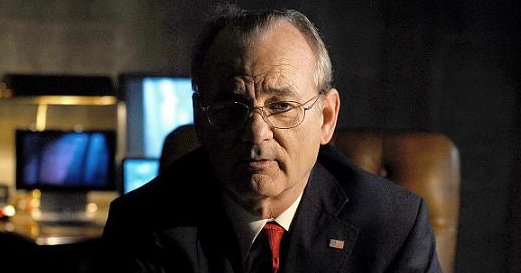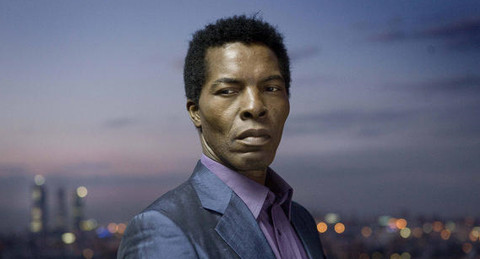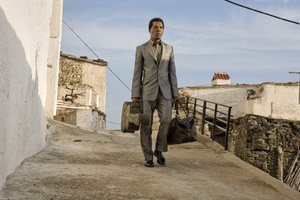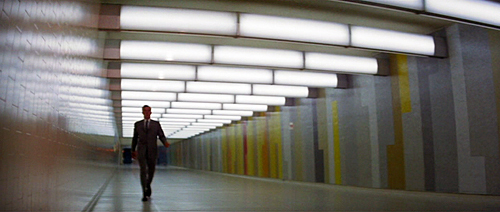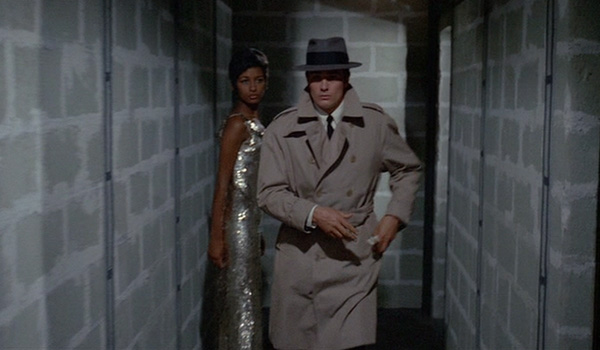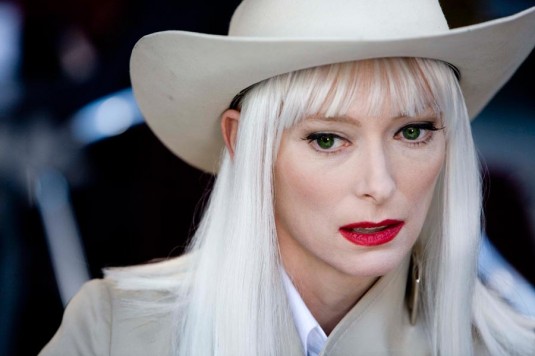Even if he didn’t like Jim Jarmusch’s latest film, which I found immensely pleasurable and mesmerizing, I’m glad that Hollywood Reporter‘s Michael Rechtshaffen at least picked up on the fact that Bill Murray, who turns up very late in the film, is “channeling” Dick Cheney when he does. This is by no means a gratuitous detail. Trust a minimalist to make absences as important as presences. None of the characters in this movie is named, all of them are assigned labels in the cast list, and the only label assigned to Murray is “American”. Furthermore, unless I missed something, the European (specifically Spanish) landscape that Jarmusch and his cinematographer Chris Doyle capture so beautifully and variously, in diverse corners of Madrid and Seville, is otherwise utterly devoid of Americans of any kind — a significant statement in itself — until a foul-mouthed Murray makes his belated experience in a bunker, as ill-tempered as the American trade press is already being about this entrancing movie. Prior to that, we’re told repeatedly, in Spanish, by a good many others in the film, that he who tries to be bigger than all the others should go to the cemetery to understand a little bit better what life is: a handful of dust.
It’s no less pertinent that a Spanish boy on the street previously asks Isaach De Bankolé — who’s channeling Lee Marvin in Point Blank, and is called “Lone Man” in the cast list — if he’s an American gangster and De Bankolé replies, “No.” It seems like an act of prophecy that an American gangster like Chaney should meet his symbolic comeuppance in the same country that might now arrest him for war crimes if he should ever make an actual appearance there. It also seems relevant that the boy and his street pals are reluctant to believe what the Lone Man says. After all, American gangsterism is a style that seems designed for export. In Point Blank, directed by an Englishman, the terrain is supposedly Los Angeles, but Lee Marvin might as well be trekking across Mars; and in Le samourai, directed by a Frenchman — another obvious source for The Limits of Control — the terrain is supposedly Paris, but Alain Delon might as well be holing up somewhere in Tokyo.
I was originally going to wait until The Limits of Control opened in early May before posting anything on this site about it, but I figure that if the trade press can sound off about it, so can I. Or at least offer a couple of first impressions of why I mainly prefer this movie to Broken Flowers.
For one thing, De Bankolé is a magnificent camera subject –a lot more fascinating to follow in his lonely rounds than Murray is in Broken Flowers, at least to me — and the urban and rural landscapes here do more for my imagination than the various American suburban stretches of Jarmusch’s previous feature.
Another thing: Tilda Swinton (identified as “Blonde,” and lightly suggesting to me Bulle Ogier in Rivette’s Duelle) observes to the Lone Man at one point that she likes films even when people are just sitting around in them and not saying anything — a declaration followed by a long pause.
“There are limits to artistic self-indulgence,” begins Todd McCarthy’s review in Variety. I disagree. And there are no limits to the pleasures that can be afforded from this kind of freedom.
I can’t wait to see this movie again. [4/24/09]

